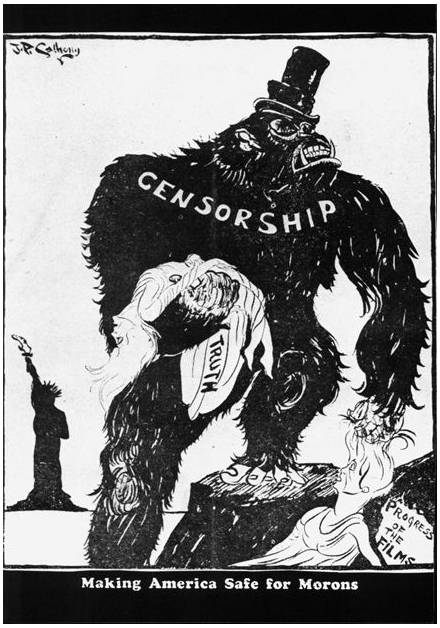
FAQ About The Influence of Film Censorship on International Cinema

What is film censorship?
Film censorship refers to the practice of regulating and controlling the content of movies to meet certain standards. This regulation is typically conducted by governmental bodies, film classification boards, or other authoritative entities. The aim is to filter or prohibit content deemed inappropriate, harmful, or objectionable based on various criteria, which can include violence, nudity, political topics, and more.

How does film censorship affect international cinema?
Film censorship influences international cinema by affecting what content can be shown or produced in different regions. This can limit filmmakers' creative expression and restrict audiences' exposure to diverse viewpoints and stories. Moreover, censorship can shape the international distribution of films, as movies may undergo editing to comply with different countries' regulations, potentially altering the film's original message.

Why do countries impose film censorship?
Countries impose film censorship for a variety of reasons, including protecting societal norms, preserving public morality, preventing political unrest, and safeguarding national security. Additionally, governments may seek to control cultural messaging and prevent the dissemination of ideas they deem contrary to public policy or threatening to social stability.

Can film censorship influence a movie's success?
Yes, film censorship can significantly influence a movie's success. In some cases, censored films may not reach their intended audience, impacting box office performance. Conversely, controversy surrounding censorship can increase media attention and curiosity, potentially boosting a film's popularity. However, extensive cuts or edits might also dilute the film's impact, affecting critical reception and audience satisfaction.

What are common elements targeted by film censorship?
Film censors commonly target elements such as explicit sexual content, graphic violence, strong language, drug use, and political or religious themes that may be deemed sensitive. The extent to which these elements are regulated can vary greatly from one country to another, depending on cultural norms and legal frameworks.

How has film censorship affected cultural diversity in cinema?
Film censorship can hinder cultural diversity in cinema by restricting filmmakers from exploring culturally specific themes and narratives. When certain topics are censored, audiences lose access to a variety of cultural expressions and stories. This can lead to a more homogenized film industry, where only universally accepted or 'safe' content is promoted internationally.

Has film censorship changed over time?
Yes, film censorship has evolved over time, often reflecting broader societal shifts. In the past, censorship might have been stricter in many areas, especially concerning topics like sexuality and politics. In recent years, some regions have become more permissive, though others have tightened controls. This fluctuation often correlates with changes in political climates, technological advancements, and shifts in public opinion.

What is the impact of film censorship on audience perception?
Film censorship can significantly impact audience perception by shaping the way viewers interpret and understand a movie. Censored content may lack depth or complexity, leading to a simplified narrative that does not fully convey the creators' intent. Additionally, audiences might infer meanings not intended by filmmakers due to the absence of key scenes or dialogues.

What role do film rating systems play in censorship?
Film rating systems play a crucial role in censorship by providing a structured framework for assessing the appropriateness of content for different age groups. These systems help viewers make informed decisions about what to watch, while also guiding filmmakers on potential audience restrictions and marketability. While ratings do not technically censor films, they can influence a film's accessibility and distribution.

How does online streaming affect film censorship?
Online streaming platforms have complicated traditional film censorship, as they often operate across multiple jurisdictions with varying regulations. This digital distribution allows films to bypass some regional censorship barriers, reaching a global audience. However, these platforms may also adhere to local censorship laws depending on their headquarters or target markets, leading to different versions of the same film being available in different regions.

Are there international standards for film censorship?
No, there are no universally accepted international standards for film censorship. Different countries have their own criteria and guidelines based on cultural values, legal frameworks, and political climates. However, there are international bodies and agreements that encourage the exchange of ideas and work towards a broader understanding and tolerance across different cultures.

What are some famous examples of films heavily censored internationally?
Several films have become famous for their contentious censorship across the globe. For instance, 'A Clockwork Orange' by Stanley Kubrick was banned in multiple countries due to its violent content, while 'The Interview' faced restrictions because of its political themes. Such films highlight the varying thresholds and sensibilities of different cultures towards certain types of content.

Do filmmakers have any recourse if they disagree with censorship decisions?
Filmmakers usually have limited recourse in contested censorship decisions, as most countries have strict legal frameworks governing such matters. However, they might appeal decisions through legal channels or engage in dialogue with censor boards to negotiate cuts or changes. Some filmmakers choose to release uncut versions of their films in international markets where possible.

How has globalization influenced film censorship practices?
Globalization has influenced film censorship by fostering international collaboration and cultural exchanges, making diverse content more accessible worldwide. This exposure has sometimes led to changes in censorship practices as countries become more receptive to foreign ideas and narratives. However, globalization has also introduced regulatory challenges as nations seek to protect cultural sovereignty while engaging with global media.

Are there cultural variations in how film censorship is perceived?
Yes, cultural variations significantly affect how film censorship is perceived. In some cultures, censorship may be seen as a necessary tool to maintain social order and protect cultural values. In others, it might be viewed as an infringement on freedom of expression. These differing perceptions are often a reflection of broader societal attitudes toward free speech and artistic liberty.

How does film censorship relate to freedom of expression?
Film censorship is often in tension with freedom of expression, as it involves limiting a creator's ability to convey messages or ideas. While advocates of censorship argue it is necessary to protect society from harmful content, opponents believe it infringes on individual rights and stifles creativity. A balance between protecting social interests and preserving artistic freedom is continually negotiated worldwide.

What are the socio-cultural implications of film censorship?
Film censorship has profound socio-cultural implications, as it not only affects the film industry but also influences public discourse and cultural norms. By controlling which narratives and images are publicly available, censorship can reinforce or challenge societal values, potentially leading to a homogenized or polarized cultural landscape. It also affects international relations, as films often serve as cultural ambassadors.

How do audiences respond to censored films?
Audience responses to censored films can vary widely. Some viewers may feel protected by censorship, appreciating its role in maintaining cultural sensitivity, while others might feel deprived of authentic narrative experiences. Additionally, the awareness of censorship may pique interest, leading audiences to seek out uncensored versions online, reflecting the complexities and varied attitudes toward content regulation.

What are some alternatives to film censorship?
Instead of traditional censorship, some suggest using advisory labels or ratings to inform audiences of potentially sensitive content, allowing viewers to make personal choices about appropriateness. Media literacy education can also empower audiences to critically engage with content, understanding it within larger societal contexts. These alternatives emphasize personal responsibility rather than institutional control.
